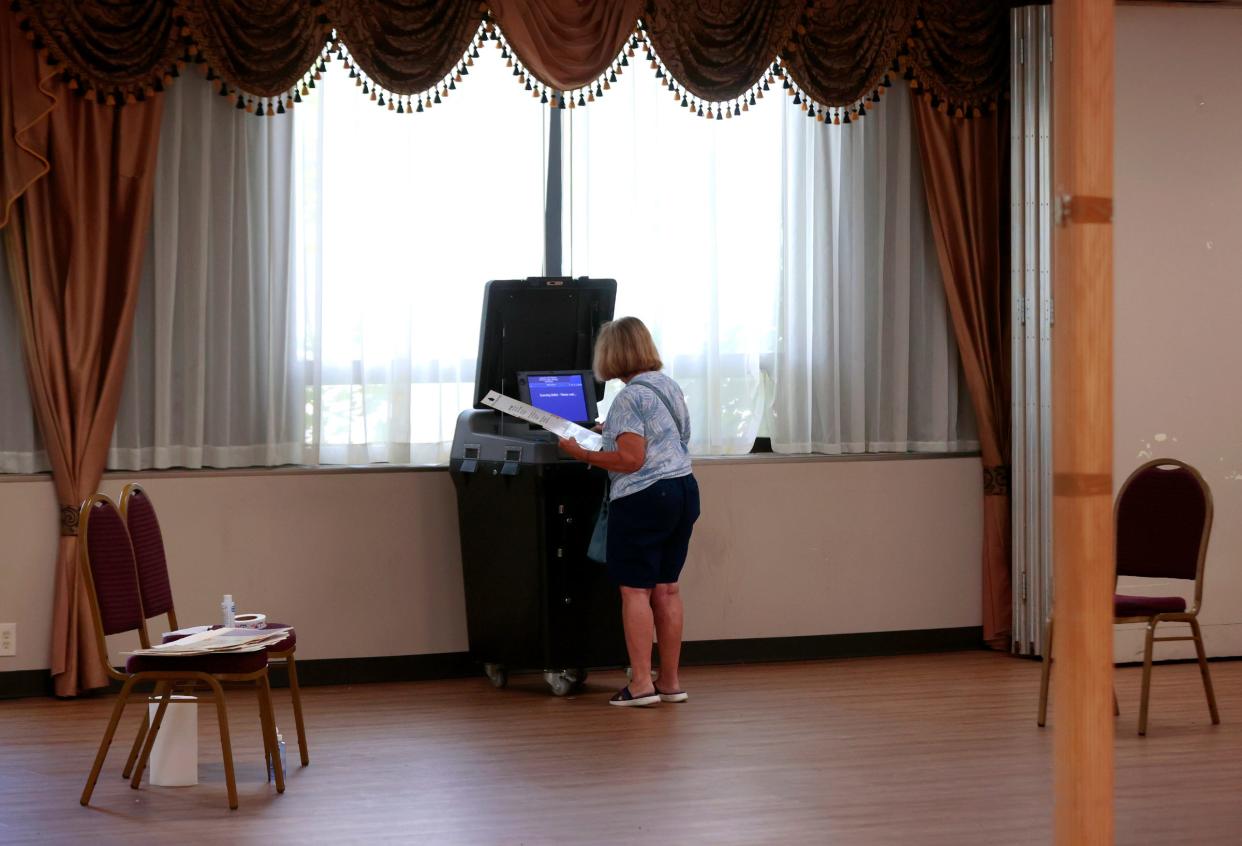Michigan special House elections estimated to cost upwards of $750,000

- Oops!Something went wrong.Please try again later.
Taxpayers in metro Detroit communities in two state House districts are slated to foot the bill for special elections Gov. Gretchen Whitmer scheduled after Democratic representatives' mayoral wins left the party without a majority in the Legislature's lower chamber.
Michigan election law gives Whitmer unilateral power to decide when to hold special elections. After swearing-in ceremonies for former state Reps. Kevin Coleman, D-Westland, and Lori Stone, D-Warren, following their mayoral victories, Whitmer added two election dates to 2024: a Jan. 30 special primary election and an Apr. 16 general election for the 13th and 25th House districts.
Next year's crowded election calendar could mean additional costs for taxpayers residing in those communities. A House-passed bill that would have required the state to reimburse local governments for special elections that don't coincide with other contests already on the calendar stalled in the Senate before the end of the year. Some officials have called on state lawmakers to pass a supplemental funding measure to cover the costs of the upcoming election anyway.
Westland Clerk Richard LeBlanc estimates it will cost about $360,000 to administer the special elections plus possible additional costs to rent polling location venues after one of the school districts in the city is not allowing him to use their buildings. Detroit Clerk Janice Winfrey estimates it will cost city taxpayers $180,000 to $200,000. Warren Clerk Sonja Djurovic Buffa gave a rough estimate of $200,000. Canton Township Clerk Michael Siegrist said he doesn't know how much the special elections will cost taxpayers in his community, but doesn't expect a substantial amount, estimating around $12,000 in payroll costs plus additional costs such as overtime for election staff costs and postage for absentee ballots.
Wayne Clerk Tina Parnell was unable to provide a cost estimate as of Monday. Dearborn Heights Clerk Lynne Senia did not respond to messages from the Free Press.
During her tenure as governor, Whitmer has scheduled a dozen special elections, but the most recent ones mark the highest-stakes such contest she's called yet with continued Democratic control of the state House on the line. She scheduled some in the past to occur on the same date as other elections on the calendar such as a 2019 special primary to fill a vacant House seat after former state Rep. Sheldon Neeley, D-Flint, won his city's mayoral election. "While elections always come with a cost, by holding the general election on the date of an already scheduled election costs are able to be reduced," Whitmer's office said in a 2019 press release announcing the special election dates.
Asked about her decision not to use other election dates on the calendar this time, Whitmer told reporters, "it was important that we move swiftly so that these communities can have representation in the Legislature."
Will lawmakers try to reimburse special election costs?
State Rep. Veronica Paiz, D-Harper Woods, introduced a bill at the start of the year to reimburse communities that administer special elections on dates that don't coincide with other regularly scheduled elections. It passed with widespread bipartisan support in the state House, but the Senate Elections and Ethics Committee never held a hearing on her bill.
Paiz said lawmakers could have predicted Coleman and Stone's mayoral victories. "I'm disappointed that this hasn't passed the Senate yet," she said. "The timing was right for it."
Committee chair state Sen. Jeremy Moss, D-Southfield, didn't foreclose the possibility of legislative action next year. "We don't typically take up policy bills that have an appropriations component without first ensuring first that funding is allocated in the budget, and, up until last month, these special elections were only hypothetical," Moss said in a text message. "Now that they are set, we'll have further conversations about next steps."
Michigan election law: Whitmer signs election bills, including new regulations of AI in ads
Coleman − who voted for the bill − said he wants to ask Democratic legislative leaders to pass a supplemental appropriations bill to reimburse local communities for the costs of holding the special elections. "I would encourage the Legislature to help these locals out, because that's a lot of money," he said. The Secretary of State's office also plans to ask lawmakers to appropriate funds to reimburse communities. Either way, taxpayers − whether those residing in the communities holding special elections or across the entire state − will pay for the additional costs associated with the two additional elections on the calendar.
Some of the clerks kicking off their busy election year early with the Jan. 30 special House primaries for the vacant seats, said they've never had to administer so many elections in a single year. And they said for the first time, they'll send out absentee ballots for two separate elections simultaneously between the Jan. 30 special primary and Feb. 27 presidential primary.
"My biggest concern is for the voters," said Buffa. She fears the overlap could create voter confusion and cause some to put the wrong ballot in the return envelope. Winfrey said she also worries about "voter fatigue."
"This not the year where we want a low voter turnout for (the) presidential election," she said.
Contact Clara Hendrickson at chendrickson@freepress.com or 313-296-5743. Follow her on X, previously called Twitter, @clarajanehen.
This article originally appeared on Detroit Free Press: Michigan special House elections estimated to cost upwards of $750K

